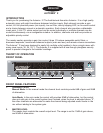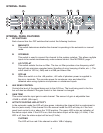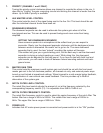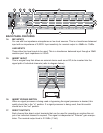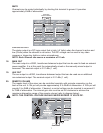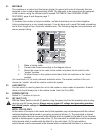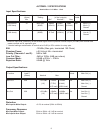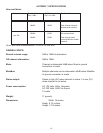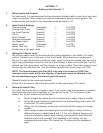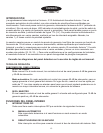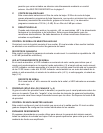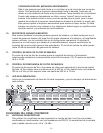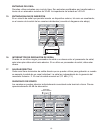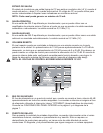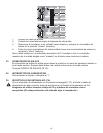
AUTOMIX
ª
2
Setting up the Automix
ª
2
1. Wiring Inputs and Outputs:
For best results, it is recommended that two-conductor shielded cable is used for all input and
output connections. When making connections remember to observe proper polarity. The
recommended strip length for the detachable screw terminals is 1/2".
2. Initial Control Settings:
Channel Levels (Faceplate) Ñ Full CCW
Channel Gain Trims (Internal) Ñ Full CCW
Aux Send Controls (Internal) Ñ Full CCW
Priority (Internal) Ñ Full CCW
Notch Controls (Internal) Ñ Full CCW
Downward Expander (Internal) Ñ Full CCW
Aux Master Level (Internal) Ñ Full CCW
Master Level (Faceplate) Ñ Full CW
Master Gain Trim (Internal) Ñ Full CCW
All channels in the ÒautoÓ mode
3. Setting the Channel Level:
Set the front panel control (of the channel that is being adjusted) to the middle (12 oÕclock)
position. Connect a mic or line input to the first channel. While someone is speaking into
the mic (in a way that it would normally be used), slowly increase the channel gain trim until a
slight ringing (feedback) is heard or until the clip led begins to blink red occasionally. Turn the
channel gain trim down slowly until the ringing is no longer audible. This is the maximum level
that the gain trim should be set. Turn the external channel level control down (full CCW).
NOTE: The internal master gain trim (#10) may need to be turned up (CW) if the
channels can be easily driven into clipping, or feedback cannot be obtained in the
normal operating range of the internal gain trim control.
Repeat this step for the remaining channels.
Return all of the external channel levels controls to their mid position (12 oÕclock).
4. Setting the Notch Filter:
The notch filter can be set in a couple of ways. It can be set using test equipment to pinpoint
frequencies that are prone to feedback, or it can be set Òby ear.Ó For the purpose of this
manual, the Òby earÓ method will be described:
A. Slowly increase the master gain trim (internal) until a slight ringing is audible.
B. Select the proper frequency range and turn the corresponding level control CW
to about the 12 oÕclock position.
C. Slowly turn the frequency control back and forth until the ringing is no longer
audible.
D. Again, slowly increase the master gain trim until ringing is heard. If this is a
different frequency, repeat steps B and C. If it is not a different frequency, try
turning the frequency control while listening to the feedback. Stop when the
feedback is as low as possible. If the feedback is still audible, turn the
corresponding level control CW toward the -15 setting until the feedback is
gone.
11



